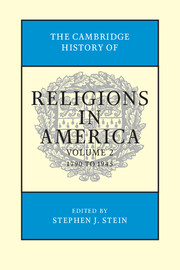Book contents
- Frontmatter
- Contents
- Contributors
- Editor's Introduction
- SECTION I RELIGION IN NORTH AMERICA
- SECTION II RELIGIONS IN THE NEW NATION, 1790–1865
- 5 Religious Organization in the New Nation
- 6 Religious and Geographical Expansion, 1790–1865
- 7 Theological Controversies, 1790–1865
- 8 Religion and Conflict from Independence to the Civil War
- 9 African Americans and the Making of Evangelical Christianities, 1760–1860
- 10 Religion and the Civil War
- SECTION III CHANGING RELIGIOUS REALITIES
- SECTION IV RELIGIOUS RESPONSES TO MODERN LIFE AND THOUGHT
- SECTION V COMPARATIVE ESSAYS
- SECTION VI RELIGION AND DIVERSE AREAS
- Index
- References
8 - Religion and Conflict from Independence to the Civil War
from SECTION II - RELIGIONS IN THE NEW NATION, 1790–1865
Published online by Cambridge University Press: 28 July 2012
- Frontmatter
- Contents
- Contributors
- Editor's Introduction
- SECTION I RELIGION IN NORTH AMERICA
- SECTION II RELIGIONS IN THE NEW NATION, 1790–1865
- 5 Religious Organization in the New Nation
- 6 Religious and Geographical Expansion, 1790–1865
- 7 Theological Controversies, 1790–1865
- 8 Religion and Conflict from Independence to the Civil War
- 9 African Americans and the Making of Evangelical Christianities, 1760–1860
- 10 Religion and the Civil War
- SECTION III CHANGING RELIGIOUS REALITIES
- SECTION IV RELIGIOUS RESPONSES TO MODERN LIFE AND THOUGHT
- SECTION V COMPARATIVE ESSAYS
- SECTION VI RELIGION AND DIVERSE AREAS
- Index
- References
Summary
It is impossible to examine the place of conflict involving religion in America without first knowing how Americans perceive the role of conflict in their society. In fact, until recently most views of American history selectively read conflict out of the national story, with one signal exception. That exception was, of course, race, whose salience was such that it could hardly be ignored. From slavery to the Civil War, from Reconstruction through segregation and lynchings, from Brown v. Board of Education to the civil rights movement, conflicts about race cast a shadow over both the American past and the American present. All other forms of conflict, however, tended to be ignored or forgotten, made the domains of specialists or of the interest groups they affected, as if a kind of collective amnesia had settled over the subject. This was true of labor strife and ethnic conflict, and it was also true of religious conflict. The overriding desire was for a picture of the American past that emphasized harmony rather than division.
At no time was this stronger than in the 1950s, the years of the Eisenhower presidency. Religion was said to be good in itself. The president himself was believed to have said, “I don't care what religion you are, as long as you believe in something,” although subsequent attempts to source the quotation have been unavailing.
- Type
- Chapter
- Information
- The Cambridge History of Religions in America , pp. 158 - 177Publisher: Cambridge University PressPrint publication year: 2000



